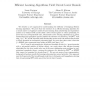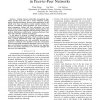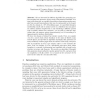2084 search results - page 2 / 417 » Proving Time Bounds for Randomized Distributed Algorithms |
111
click to vote
SPAA
1992
ACM
15 years 6 months ago
1992
ACM
An O(log n) time, n processor randomized algorithm for computing the k-nearest neighbor graph of n points in d dimensions, for fixed d and k is presented. The method is based on t...
134
Voted
COLT
2006
Springer
15 years 6 months ago
2006
Springer
We describe a new approach for understanding the difficulty of designing efficient learning algorithms. We prove that the existence of an efficient learning algorithm for a circui...
118
click to vote
INFOCOM
2005
IEEE
15 years 8 months ago
2005
IEEE
Abstractā Existing random membership management algorithms provide each node with a small, uniformly random subset of global participants. However, many applications would beneļ¬...
119
click to vote
PPSN
2010
Springer
15 years 25 days ago
2010
Springer
Abstract. We present a new method for proving lower bounds in evolutionary computation based on ļ¬tness-level arguments and an additional condition on transition probabilities bet...
114
click to vote
APPROX
2008
Springer
15 years 4 months ago
2008
Springer
Abstract. We are interested in efficient algorithms for generating random samples from geometric objects such as Riemannian manifolds. As a step in this direction, we consider the ...



